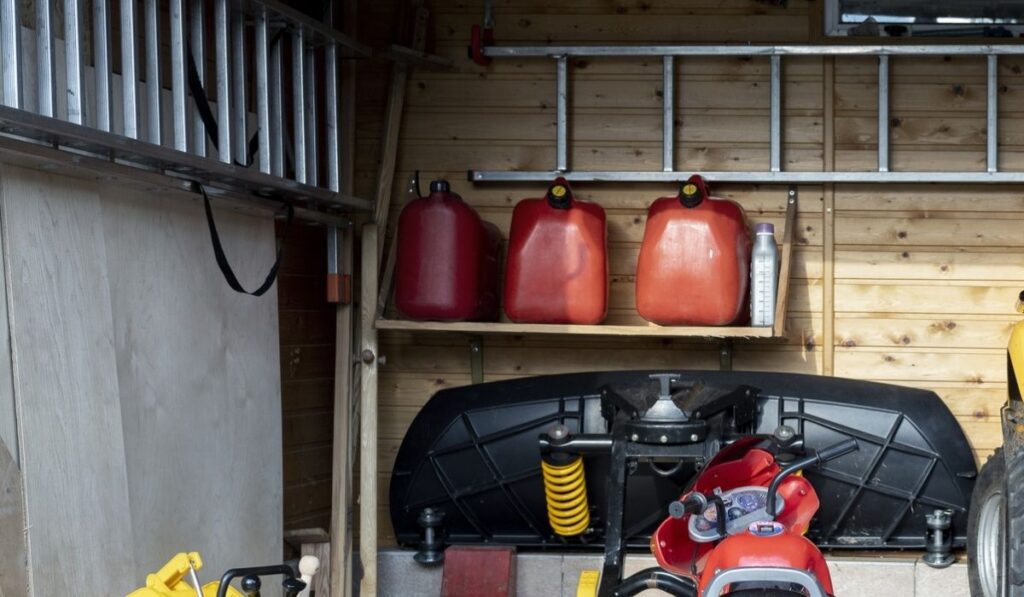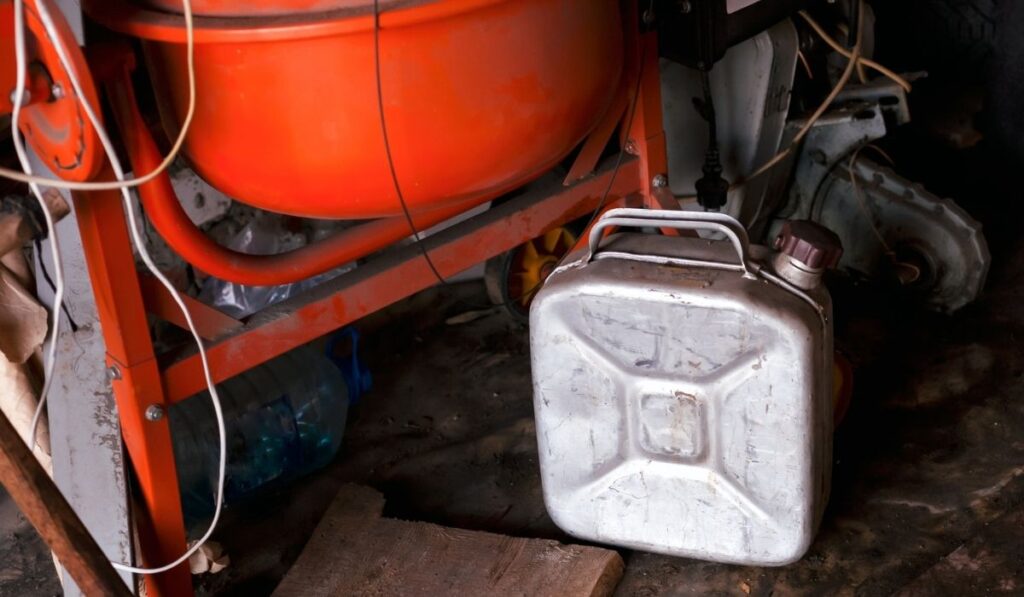Storing gasoline is not something to take lightly. More times than not, the correct precautions are not taken to store it properly. There is a lot to consider no matter where you store gas. You should especially be concerned if it’s being stored underneath the same roof you and your family live in.
Yes, it is okay to store gasoline in your garage. Storing gas in a garage is not as dangerous as you may think. In fact, it can be done safely if the proper precautions are taken. If you ever need to store gas in your garage, it is highly recommended that you use a specialized storage container.
Make sure to keep the container in a cool, dry place. If you follow these simple precautions, you can store gasoline in your garage without any problems.
Is It Safe To Store Gasoline In The Garage?

When it comes down to actually storing gasoline, there are certain safety precautions that must always be followed in order to protect yourself and the environment!
First and foremost, always store gas in an approved container. Never store gas in plastic containers or soda bottles – these containers are not meant to hold fuel and can easily ignite if exposed to heat.
It’s also important to make sure that your garage is well-ventilated. Gasoline fumes can be dangerous, so it’s crucial that you allow fresh air to circulate properly. If possible, install a ventilation fan in your garage – this will help keep the air clean and safe.
Finally, never store gasoline near any open flames or sparks. This includes cigarettes, lighters, matches, and anything else that may create a spark.
If you need to smoke in the garage, make sure that all cigarettes are extinguished before putting them out – never throw a cigarette butt on top of gasoline or inside of an open container.
Gasoline fumes can be dangerous if they come into contact with heat, so it’s important to store gas properly and safely at home. If you need to keep gasoline in your garage, make sure it’s safe and well-ventilated.
What Should You Use To Store Gasoline?
One question that many people have is whether or not they can store gasoline in their garage. The answer to this question depends on what you are planning to do with the gasoline when it comes time for use.
There are basically two options when it comes to storing gas, either an approved container or a fuel stabilizer product. However, if you choose one of these methods, there are certain rules that must be followed and safety precautions that should always be taken into consideration before beginning your project!
If You Need To Store Gasoline – Tanks Or Containers?

When it comes down to actually choosing between tanks or containers for storage purposes there really isn’t much difference at all besides size requirements due mainly in part because of fire codes.
Since both tanks and containers have their own unique set of pros and cons it is ultimately up to the user as to which will be more beneficial for their needs.
Tanks:
- Usually come in a variety of sizes, making them perfect for large or small scale storage projects
- Can easily be transported if necessary
- Made out of durable materials that can withstand outdoor conditions
- Relatively low cost compared to other options on the market
Containers:
- Often come in a wide range of shapes and colors, making it easy to find one that matches your specific needs or style preferences
- Tend not to be as bulky as tanks, making them ideal for smaller spaces
- May not be able to hold as much gasoline as a tank
- Will have to be refilled more frequently than tanks of larger sizes or if being used for long-term storage purposes.
Is It Okay To Keep Gasoline In a Detached Garaged?
A detached garage is a good place to store gasoline. There are lots of risks involved with storing gas in your home, but if you’re using it for an emergency generator and need to keep the tanks close by, then having them in the attached garage isn’t such a bad idea.
The bigger problem occurs when there is more than one tank or they aren’t properly stored. If fuel spills on concrete flooring (a common occurrence), the vapors will rise up into the house through air conditioning ducts; even worse would be having gasoline fumes ignite from hot engine parts and cause a fire that could spread to wooden structures like garages and homes very rapidly due to their high flammability ratings.
So, if you are going to store gasoline in a detached garage, be sure that the tanks are not near any heat sources like engines or pilot lights. Also, be sure there is no way for vapors to escape into the house – use proper ventilation and keep tank caps tight. Finally, you should always have an adequate fire extinguisher on hand in case of emergencies.
It’s also important to remember that gasoline should never be stored inside your home. Not only is it a fire hazard, but fumes can seep out and cause health problems.
If you absolutely need to store gas containers inside, make sure they are in a well-ventilated area away from bedrooms and living spaces. And always follow the safety instructions on
Storing gasoline in an attached garage is a risky business because there are so many things that could happen if it isn’t stored properly.
It can be very dangerous, especially since garages house other flammable items like lawnmowers and oil rags to name a few; these create the perfect conditions for potential flash fires or worse yet explosions.
How Long Can You Keep Gasoline In Your Garage?
If you keep gasoline in the garage for an extended period of time (over one year), store it outside under a tarp or other weatherproof cover to prevent evaporation.
Remember that storing gas near heat sources such as car engines or pilot lights will also increase risks of explosions and fires so avoid storing them anywhere close by!
The best option for storing gasoline will be to only have it on hand immediately prior to the required use of it.
